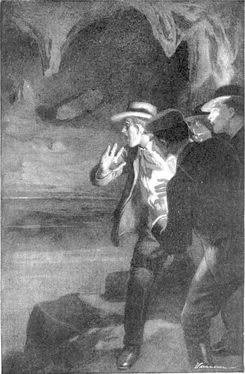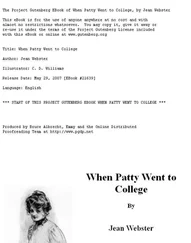Jean Webster - The Four-Pools Mystery
Здесь есть возможность читать онлайн «Jean Webster - The Four-Pools Mystery» весь текст электронной книги совершенно бесплатно (целиком полную версию без сокращений). В некоторых случаях можно слушать аудио, скачать через торрент в формате fb2 и присутствует краткое содержание. Жанр: Классический детектив, на английском языке. Описание произведения, (предисловие) а так же отзывы посетителей доступны на портале библиотеки ЛибКат.
- Название:The Four-Pools Mystery
- Автор:
- Жанр:
- Год:неизвестен
- ISBN:нет данных
- Рейтинг книги:3 / 5. Голосов: 1
-
Избранное:Добавить в избранное
- Отзывы:
-
Ваша оценка:
- 60
- 1
- 2
- 3
- 4
- 5
The Four-Pools Mystery: краткое содержание, описание и аннотация
Предлагаем к чтению аннотацию, описание, краткое содержание или предисловие (зависит от того, что написал сам автор книги «The Four-Pools Mystery»). Если вы не нашли необходимую информацию о книге — напишите в комментариях, мы постараемся отыскать её.
The Four-Pools Mystery — читать онлайн бесплатно полную книгу (весь текст) целиком
Ниже представлен текст книги, разбитый по страницам. Система сохранения места последней прочитанной страницы, позволяет с удобством читать онлайн бесплатно книгу «The Four-Pools Mystery», без необходимости каждый раз заново искать на чём Вы остановились. Поставьте закладку, и сможете в любой момент перейти на страницу, на которой закончили чтение.
Интервал:
Закладка:
The coroner commenced immediately with the subject of the quarrel with his father on the night before the murder, and Radnor answered all the questions frankly and openly. He made no attempt to gloss over any of the details. What put the matter in a peculiarly bad light, was the fact that the cause of the quarrel had been over a question of money. Rad had requested his father to settle a definite amount on him so that he would be independent in the future, and his father had refused. They had lost their tempers and had gone further than usual; in telling the story Radnor openly took the blame upon himself where, in several instances, I strongly suspected that it should have been laid at the door of the Colonel. But in spite of the fact that the story revealed a pitiable state of affairs as between father and son, his frankness in assuming the responsibility won for him more sympathy than had been shown since the murder.
"How did the clock get broken?" the coroner asked.
"My father knocked it off the mantelpiece onto the floor."
"He did not throw it at you as Solomon surmised?"
Radnor raised his head with a glint of anger.
"It fell on the floor and broke."
"Have you often had quarrels with your father?"
"Occasionally. He had a quick temper and always wished his own way, and I was not so patient with him as I should have been."
"What did you quarrel about?"
"Different things."
"What, for instance?"
"Sometimes because he thought I spent too much money, sometimes over a question of managing the estate; occasionally because he had heard gossip about me."
"What do you mean by 'gossip'?"
"Stories that I'd been gambling or drinking too much."
"Were the stories true?"
"They were always exaggerated."
"And this quarrel the night before his death was more serious than usual?"
"Possibly—yes."
"You did not speak to each other at the breakfast table?"
"No."
Radnor's face was set in strained lines; it was evident that this was a very painful subject.
"Did you have any conversation later?"
"Only a few words."
"Please repeat what was said."
Radnor appeared to hesitate and then replied a trifle wearily that he did not remember the exact words; that it was merely a recapitulation of what had been said the night before. Upon being urged to give the gist of the conversation he replied that his father had wished to make up their quarrel, but on the old basis, and he had refused. The Colonel had repeated that he was still too young a man to give over his affairs into the hands of another,—that he had a good many years before him in which he intended to be his own master. Radnor had replied that he was too old a man to be treated any longer as a boy, and that he would go away and work where he would be paid for what he did.
"And may I ask," the coroner inquired placidly, "whether you had any particular work in mind when you made that statement, or was it merely a figure of rhetoric calculated to bring Colonel Gaylord to terms?"
Rad scowled and said nothing, and the rest of his answers were terseness itself.
"Did you and your father have any further conversation on the ride over, or in the course of the day?"
"No."
"You purposely avoided meeting each other?"
"I suppose so."
"Then those words after breakfast when you threatened to leave home were absolutely the last words you ever spoke to your father?"
It was a subject Radnor did not like to think about. His lips trembled slightly and he answered with a visible effort.
"Yes."
A slight murmur ran around the room, partly of sympathy, partly of doubt.
The coroner put the same question again and Radnor repeated his answer, this time with a flush of anger. The coroner paused a moment and then continued without comment:
"You entered the cave with the rest of the party?"
"Yes."
"But you left the others before they had made the complete round?"
"Yes."
"Why was that?"
"I was not particularly interested. I had seen the cave many times before."
"Where did you leave the party?"
"I believe in the gallery of the broken column."
"You left the cave immediately?"
"Yes."
"Did you enter it again?"
"No."
"You forgot Miss Mathers's coat and left it in the gallery of the broken column?"
"So it would seem."
"Did you not think of that later and go back for it?"
Radnor snapped out his answer. "No, I didn't think anything about the coat."
"Are you in the habit of leaving young ladies' coats about in that off-hand way?"
A titter ran about the room, and Rad did not deign to notice this question.
I was indignant that the boy should be made to face such an ordeal. This was not a regular trial and the coroner had no right to be more obnoxious than his calling required. There was a glint of anger in Radnor's eyes; and I was uneasily aware that he no longer cared what impression he made. His answers to the rest of the questions were as short as the English language permitted.
"What did you do after leaving the cave?"
"Went home."
"Please go into more detail. What did you do immediately after leaving the cave?"
"Strolled through the woods."
"For how long?"
"I don't know."
"How long do you think?"
"Possibly half an hour."
"Then what did you do?"
"Returned to the hotel, ordered my horse and rode home."
"Why did you not wait for the rest of the party?"
"Didn't feel like it."
The question was repeated in several ways, but Radnor stubbornly refused to discuss the matter. He had promised me, the last thing before coming to the hearing, that he would clear up the suspicious points in regard to his conduct on the day of the crime. I took him in hand myself, but I could get nothing more from him than the coroner had elicited. For some reason he had veered completely, and his manner warned me not to push the matter. I took my seat and the questioning continued.
"Mr. Gaylord," said the coroner, severely, "you have heard the evidence respecting your peculiar behavior when you returned to the hotel. Three witnesses have stated that you were in an unnaturally perturbed condition. Is this true?"
Radnor supposed it must be true. He did not wish to question the gentlemen's veracity. He did not remember himself what he had done, but there seemed to be plenty of witnesses who did remember.
"Can you give any reasons for your strange conduct?"
"I have told you several times already that I can not. I did not feel well, and that is all there was to it."
A low murmur of incredulity ran around the room. It was evident to everyone that he was holding something back, and I could see that he was fast losing the sympathy he had gained in the beginning. I myself was at a loss to account for his behavior; as I was absolutely in the dark, however, I could do nothing but let matters take their course. Radnor was excused with this, and the next half hour was spent in a consideration of the foot-prints that were found in the clay path at the scene of the murder. The marks of Cat-Eye Mose were admitted immediately, but the others occasioned considerable discussion. Facsimiles of the prints were produced and compared with the riding boots which the Colonel and Radnor had worn at the time. The Colonel's print was unmistakable, but I myself did not think that the alleged print of Radnor's boot tallied very perfectly with the boot itself. The jury seemed satisfied however, and Radnor was called upon for an explanation. His only conjecture was that it was the print he had left when he passed over the path on his way to the entrance.
The print was not in the path, he was informed; it was in the wet clay on the edge of the precipice.
Radnor shrugged. In that case it could not be the print of his boot. He had kept to the path.
Читать дальшеИнтервал:
Закладка:
Похожие книги на «The Four-Pools Mystery»
Представляем Вашему вниманию похожие книги на «The Four-Pools Mystery» списком для выбора. Мы отобрали схожую по названию и смыслу литературу в надежде предоставить читателям больше вариантов отыскать новые, интересные, ещё непрочитанные произведения.
Обсуждение, отзывы о книге «The Four-Pools Mystery» и просто собственные мнения читателей. Оставьте ваши комментарии, напишите, что Вы думаете о произведении, его смысле или главных героях. Укажите что конкретно понравилось, а что нет, и почему Вы так считаете.












